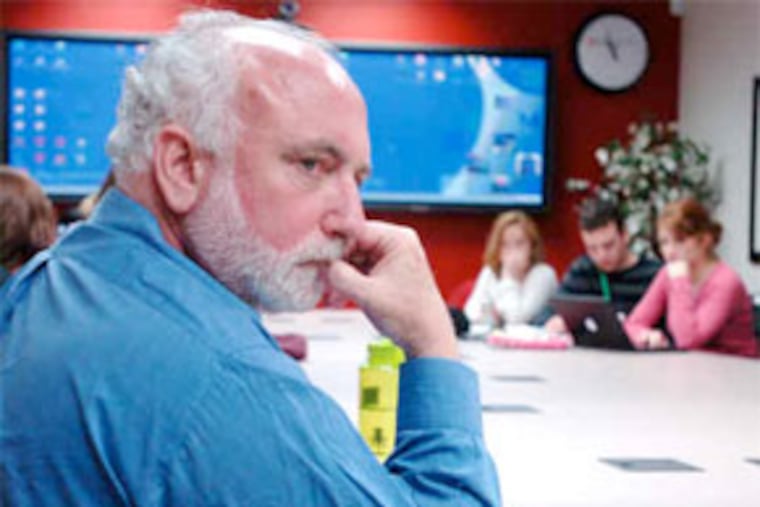International award for Temple researcher
Temple University professor Laurence Steinberg will take his research on teen brain development and risky behavior international with a $1 million award he received yesterday.

Temple University professor Laurence Steinberg will take his research on teen brain development and risky behavior international with a $1 million award he received yesterday.
A leading scholar on juvenile justice, Steinberg received the award from the Jacobs Foundation of Switzerland, one of Europe's largest philanthropic organizations in youth development.
Steinberg was selected from among 19 nominees by a cross-disciplinary jury of seven scientists from major research institutions around the world. The award, according to a foundation news release, recognizes "outstanding scientific accomplishments" in "contributions to the improvement of the living conditions of young people."
"I was speechless," said Steinberg, who was informed of the honor in a phone call from the Zurich foundation.
"I'm honored, of course, by the recognition given to the research my colleagues and I have been doing, but I'm also excited by the statement this makes about our field. It's an extremely generous prize. As far as I know, the scientific study of adolescent development has never been given this sort of attention."
The funding will allow Steinberg to compare his findings on Americans with youths in other countries.
"One of the really important questions that I hope to be able to address is whether the patterns that we're seeing in our American samples are driven by the biology of adolescents or whether what we're finding here is idiosyncratic to us and the ways we treat adolescents in our culture," Steinberg, 57, said in an interview this week.
The foundation, which funds academic research and pilot programming around the world, was created in 1988 by Klaus J. Jacobs, who made his fortune in cocoa and coffee.
The award is believed to be one of the largest of its kind in the social sciences. The Nobel Prize carries $1.4 million, while the prestigious MacArthur Foundation fellowships pay $500,000.
Given for the first time this year, the Klaus J. Jacobs Research Prize was established after Jacobs' death in 2008.
The award, which will be presented Dec. 3 in Zurich, must be used for research.
Juvenile justice
Steinberg is a national figure in juvenile justice, most recently advising the American Psychological Association in preparation of a brief for the U.S. Supreme Court case on whether it is constitutional to sentence juveniles to life in prison without possibility of parole for crimes other than homicide. The court heard arguments this week.
Steinberg argues that it is unconstitutional because teens' brains are not as developed as those of adults.
"It may make them less mature than adults in a way that makes them less responsible for their behavior," he said. "It doesn't make them not guilty, but it makes them less guilty."
At puberty, brains become much more susceptible to rewards-driven behavior because of a surge in dopamine activity, and the system that governs impulse control isn't fully developed, Steinberg explained.
"So you've got this period of vulnerability during middle adolescence," he said, citing ages 14 to 17 in particular.
Teens are more prone to reckless driving, criminal activity, unprotected sex, and other risky behavior as a result, he said.
Steinberg also was a consultant for the psychological association in the 2005 case Roper v. Simmons, in which the Supreme Court abolished the juvenile death penalty.
Parenting and other influences also play an important role in teen development, Steinberg has found.
Among the 11 books he has written is The 10 Basic Principles of Good Parenting, in which he says a combination of "warmth and firmness" best raises children.
Taking it global
Steinberg has studied U.S. youths extensively through interviews, observation, testing, and brain imaging. Using his award, he hopes to begin work abroad with other researchers as soon as the spring. He declined to say which countries, but said places on every continent were under consideration.
Foundation officials said Steinberg, who was nominated by Temple's psychology department, best demonstrated what they had in mind when creating the award.
"A trailblazer in the field of developmental psychology, Professor Steinberg exemplifies the foundation's commitment to combining research, application, and active communication to improve the lives of young people," said Bernd Ebersold, chief executive officer of the Jacobs Foundation, in a statement.
The foundation spends about 35 million Swiss francs a year on research and intervention programming - nearly $35 million at current exchange rates. Its endowment is valued at about $2.3 billion.
Jacobs is best known as the founder of Barry Callebaut AG, a leading producer of cocoa, chocolate, and confectionary products.
Honored by Temple
A 21-year Temple veteran, Steinberg was made a distinguished professor - the highest designation a faculty member can receive - by then-president Peter Liacouras in 1999.
He's also done research in many other areas, including adolescent drug use and criminal behavior and the effect of after-school jobs on teens.
He wrote Crossing Paths, a book about the intersection of children's adolescence with their parents' midlife years, with his wife, Wendy.
Steinberg grew up in the New York suburbs and set out to be a writer until he fell in love with psychology during his freshman year in college.
He got his bachelor's degree in psychology at Vassar College and his doctorate in developmental psychology at Cornell University. He previously worked at the University of California, Irvine, and the University of Wisconsin.
Steinberg lives in Center City.
He and his wife have a son, Benjamin, 25, an assistant editor at Random House in New York City.
Steinberg said he was grateful to Temple for giving him the opportunity to do his research.
"A lot of what I've been able to do as a researcher is directly attributable to the support I've gotten from Temple," he said. "I'm in one of the best psychology departments in the world."